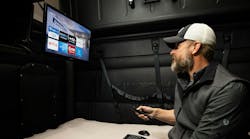Name: Dr. Robert Schumacher, general director, Delphi's Wireless Business div.
Background: Ph.D. in physics, UCLA. Joined Hughes Research Laboratories (HRL) in 1982. Organized Delco Electronics Advanced Technology Center in 1995; appointed Director of Advanced Engineering in 1997. Founded the Mobile MultiMedia Business Line in 1998; named to current position in 2001. Holds13 patents; over 40 published articles on plasma science and automotive technology.
Wireless technology is poised to reshape how the trucking industry conducts business at almost every level, says Dr. Robert Schumacher, general director of Delphi's Wireless Business division. However, he's also aware that trucking's operating environment is very unforgiving when it comes to sensitive electronic equipment. Thus, durability and reliability are critical if wireless technology is to succeed in trucking.
“What's happening now is that a wide range of technology is expanding its presence and accelerating in capability every year in the trucking industry,” Schumacher says.
“Components in satellite radios and wireless communication devices have to resist shock vibration, dust, humidity, thermal shock, fluid spills, over-voltage and even reverse-voltage events. That's one of our biggest challenges — taking the capabilities of consumer-grade electronics and making them robust enough to handle the stress trucking puts on them.”
While cost has historically been an issue, Schumacher notes that cellular wireless networks have matured to offer better national coverage at a lower cost. He adds that the advantages of adopting “wireless fleet management systems” are now almost indisputable. This fleet management capability could enable wireless systems to forever alter the way trucking fleets do business.
“Remember that the average Class 8 tractor is an asset worth $100,000, rising to $300,000 when you add in the driver's salary, fuel, insurance, etc.,” Schumacher explains. “So while many fleets still focus on the initial cost of modern wireless truck systems, the benefit those systems can provide in terms of lower operating costs, increased efficiency, and better customer service could be worth far more to a carrier.”
Improving the general business processes of trucking is the future thrust of wireless technology, he says. Most fleets understand the basic advantages of tracking and tracing their vehicles. In the future, the wireless systems on trucks will also be able to automatically feed diagnostic information back to fleets, giving them access to real-time information about the condition of engines, brakes, chassis components, etc. With this kind of data, fleets can reduce downtime and put already-stretched maintenance resources where they're needed most.
Future capabilities also include generating invoices automatically when electronic notification of a truck's arrival and unloading status is received, as well as automatic load notification so drivers don't need to call dispatchers for new instructions. “It's about making the ‘back office’ more efficient and more proactive,” Schumacher explains. “This, in turn, allows both drivers and dispatchers to focus on more demanding tasks.”
Security is another key issue for wireless fleet management systems, he notes, as more information and greater control of trucks can help minimize the threat of cargo theft and terrorist attack. “Trucks carrying cigarettes, alcohol, and high-tech electronics can be hauling loads worth over $1 million or more; when cargo like this is stolen, the insurance hits are huge,” Schumacher says.
“On the homeland security side, history shows us that ‘truck bombs’ have been a favorite weapon of terrorists: from the Marine barracks in Beirut to the first World Trade Center attack and the bombing in Oklahoma City,” he says. “For hazmat carriers, petroleum and chemical tanker fleets, wireless systems could provide a security advantage — from tracking a hijacked truck to providing remote shut-down capabilities.”
Still, Schumacher admits such systems remain a tough sell. “Fleets must be convinced of the business challenges this technology can help them overcome, as well as how costs can be recovered in just 8 to 12 months. Once they understand that they can recoup their expense in a relatively short period of time and keep the savings for years afterward, more fleets will adopt the technology,” he says.
Each month this column looks at emerging truck technology issues through the eyes of a leading engineer.


